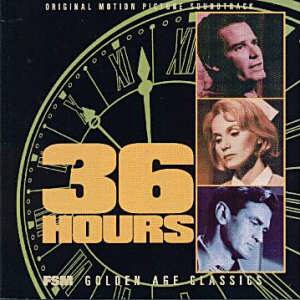Dimitri TIOMKIN
36 Hours
OST
FILM SCORE MONTHLY Vol. 5 No. 5 [66:47]
Available from Film Score Monthly, 8503 Washington Boulevard, Culver City, CA90232; Tel: 1-888-345-6335; overseas: 310-253-9595; fax: 310-253-9588;
Info@filmscoremonthly.com

36 Hours (1964) was an off-beat World War II thriller starring James Garner as an American Major who is privy to the D-Day landing plans. He is drugged in Lisbon, kidnapped by the Germans and persuaded that he has woken up in hospital, recovering from amnesia, many years after the war is over. Using this ruse the Germans easily find out that the planned landings are scheduled for Normandy. Garner discovers the ruse, confuses the Germans and escapes. The cast also included Rod Taylor as the German officer mastermind behind the deception and Eva Marie Saint as his nurse assistant who (of course) turns out to be a victim of the concentration camps and in the end on the side of the good guys.
Dimitri Tiomkin's atmospheric and powerfully dramatic score contributed to the success of the film. It was originally released on a Vee-Jay stereo LP in 1965. This new CD release features 23 tracks of music with three bonus tracks centred mainly on the inevitable 'pop' song used to commercialise the recording. This song, 'A Heart Must Learn to cry' is no better no worse than the average. It is referenced in certain cues for scenes between Garner and Marie Saint. As usual the analytical notes by Jeff Bond and Lukas Kendall are comprehensive and informative.
Tiomkin had, of course, very successfully scored another World War II thriller, The Guns of Navarone in 1961. That film was all spectacular outdoor-action whereas 36 Hours, was darker, more emotional, more internal and therefore Tiomkin responded accordingly. His music contrasts tense, nervous figures with quieter slower cues suggesting melancholy, disorientation and bewildered introspection. The Main Title and many of the action/tension cues have the familiar Tiomkin strident figures driving the music forward through complicated cross-rhythms and swiftly fluctuating tempi. The familiar bass figures are there too: the heavy tread, the percussive piano punctuated by tolling bells - all adding considerable excitement. One of the most interesting tracks 'Lisbon Cha-Cha' has a catchy take on that popular 1960s pop style made tense by the way it crumples into dark swirls as Garner's character succumbs to the German kidnappers' drugged coffee. Tiomkin also uses the piano very prominently in this score often very much in the style of a Rachmaninov or Tchaikovsky concerto.
Another very worthwhile Film Music Monthly refurbishment of a most appealing Tiomkin score.
Ian Lace

Return to Index